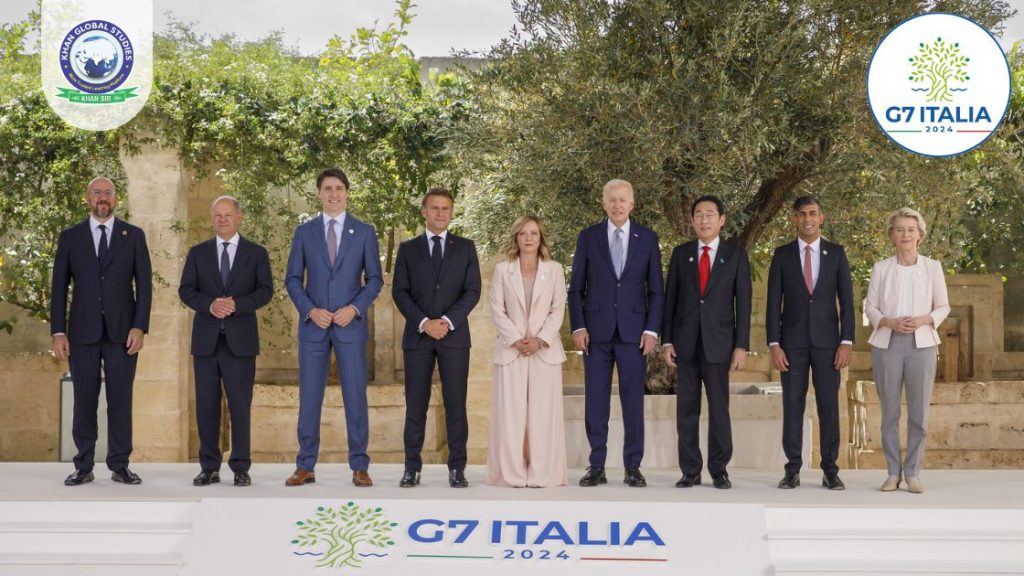The G7 Summit is an annual event that brings together the leaders of some of the world’s most advanced economies. It serves as an important platform to discuss and address global challenges.
From Modest Beginnings to Global Stage
The G7 began in 1973 when finance ministers from major industrialized nations gathered in response to the 1973 oil crisis and the resulting financial turmoil. This initial gathering of six countries – the US, UK, France, West Germany, Japan and Italy – laid the groundwork for the G7. Canada joined in 1976, solidifying the group’s current composition. Notably, the G7 was once the G8, with Russia joining in 1997. However, it was expelled in 2014 due to Russia’s annexation of Crimea, causing the group to revert to the G7.
Member Countries and Significance
The G7 comprises Canada, France, Germany, Italy, Japan, the United Kingdom and the United States, while the European Union is represented by the President of the Commission and the President of the European Council. These countries have enormous economic and political influence, making their coordinated efforts impressive. The G7 Summit promotes cooperation on critical issues such as trade, security, economic stability and climate change. Through joint statements and initiatives, the G7 aims to shape global solutions.
Looking Ahead
The influence of the G7 has been debated in recent years with the rise of other economic powerhouses. However, the group’s importance lies in its ability to bring together major democracies to tackle shared challenges. As the global landscape continues to evolve, the G7’s ability to adapt and collaborate with other emerging economies will be crucial to its enduring relevance. While the G7 may not be the sole agenda-setter on the world stage, its role in promoting consensus and leading by example remains valuable.
G7 Summit: A Platform for Global Cooperation in a Complex World
The G7 Summit, an annual gathering of the leaders of the world’s most advanced economies, is much more than a simple meeting. It is the cornerstone of global governance, a forum for building consensus and tackling pressing issues that affect us all.
Historic Response to Economic Turmoil
The story of the G7 begins during a crisis. The 1973 oil crisis threw the global economy into turmoil, prompting the major industrial nations to seek solutions. In 1975, finance ministers from six countries – the US, UK, France, West Germany, Japan and Italy – gathered for the first time. This initial gathering laid the groundwork for the G7, which was joined by Canada a year later. Russia’s brief membership (1997-2014) marked a period of hope for broader cooperation in the form of the G8, but it was expelled due to its occupation of Crimea. The European Union, though not a formal member, participates through its leadership, contributing to the G7’s focus on democratic values.
Beyond Economics: A Spectrum of Global Challenges
While economic stability remains a core concern, the G7’s agenda has broadened considerably. Leaders take on complex worlds, such as:
- Climate change: The G7 has played a key role in advancing ambitious climate action, which played a key role in the landmark 2015 Paris Agreement.
- Global Health: From fighting HIV/AIDS to coordinating responses to pandemics like COVID-19, the G7 plays a vital role in protecting global health.
- Security: From terrorism to regional conflicts, the G7 fosters cooperation on security threats, promoting peace and stability.
- Trade and Development: The G7 works to establish fair trade practices and promote sustainable development, particularly in less developed countries.
Adjusting to a Changing World
The G7’s influence has been questioned with the rise of new economic powers. However, its strength lies in its ability to bring together major democracies to address shared challenges. The G7 can play an important role in:
- Bridging the Gap: By promoting dialogue and cooperation with emerging economies, the G7 can ensure a more inclusive approach to global governance.
- Leading by Example: The G7 can set high standards for transparency, accountability and commitment to democratic principles.
- Promoting Action: Through joint initiatives and declarations, the G7 can mobilise broad international action on critical issues.
Importance of the G7 Summit
The importance of the G7 Summit can be seen through several key aspects:
- Global Leadership: The G7 wields a significant amount of the world’s economic and political power. Their coordinated efforts on issues such as trade, climate change, and security can have an impact on policies and actions around the world.
- Collective Action: The G7 Summit is a forum for these major economies to find common ground and develop joint initiatives. This collective action can be much more effective than individual countries working alone, especially in tackling complex global challenges.
- Agenda-Setting: Issues addressed at the G7 Summit often set the stage for discussions at other international forums. By drawing attention to important topics and proposing solutions, the G7 can influence the broader global agenda.
- Norm Promotion: G7 countries are generally considered to be leading democracies with strong commitments to human rights, transparency, and the rule of law. By collaborating on these issues, the G7 can promote these norms internationally, encouraging other countries to do the same.
- Catalyst for Change: The G7 summit can be a catalyst for positive change by motivating financial commitments and political will. For example, the G7 has played a key role in securing pledges of financial support for developing countries and promoting clean energy initiatives.
However, it is important to acknowledge some criticisms of the G7’s importance:
- Limited Membership: The G7 represents only a small portion of the world’s population and its share of global GDP is declining. With the rise of emerging economies, some argue that the G7 is less relevant.
- Lack of Enforcement: Decisions taken at G7 summits are not legally binding. This can limit their effectiveness, especially if member countries lack strong political will to follow through on commitments.
- Exclusion of Key Players: Major economies such as China and India are not members, raising questions about the G7’s ability to address real global challenges.
Conclusion
The G7 Summit serves as an important forum for international cooperation in a complex and interconnected world. By facilitating dialogue and joint action, the G7 seeks to address critical global challenges and shape a more stable and prosperous future for all.





